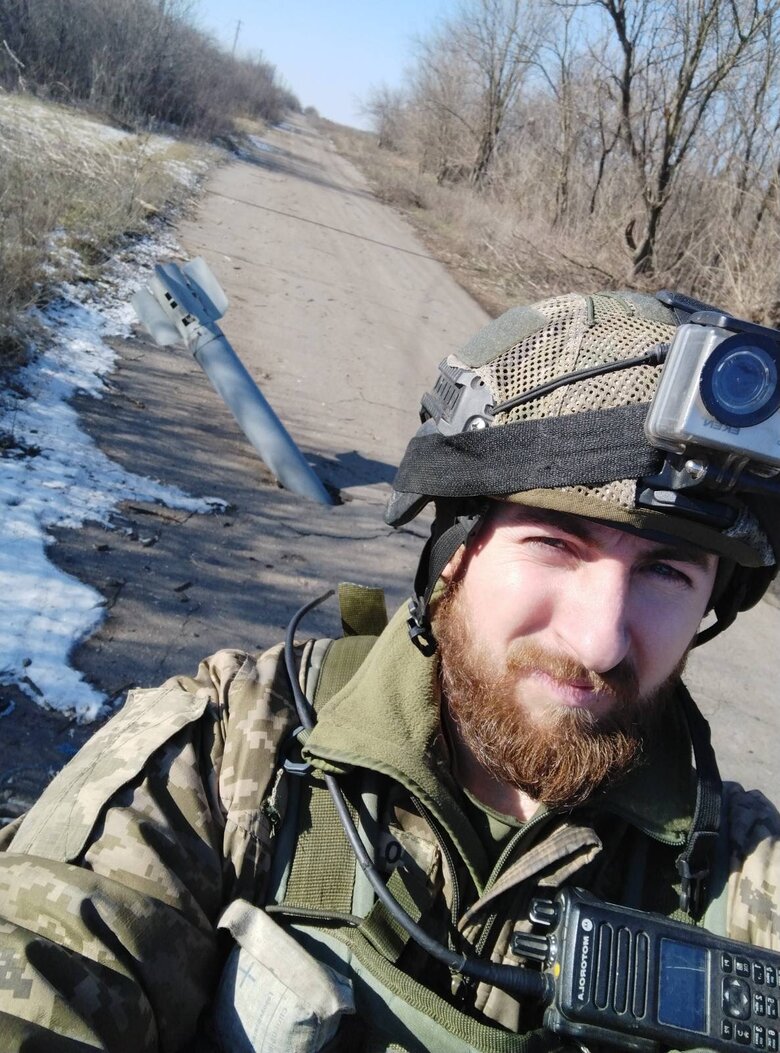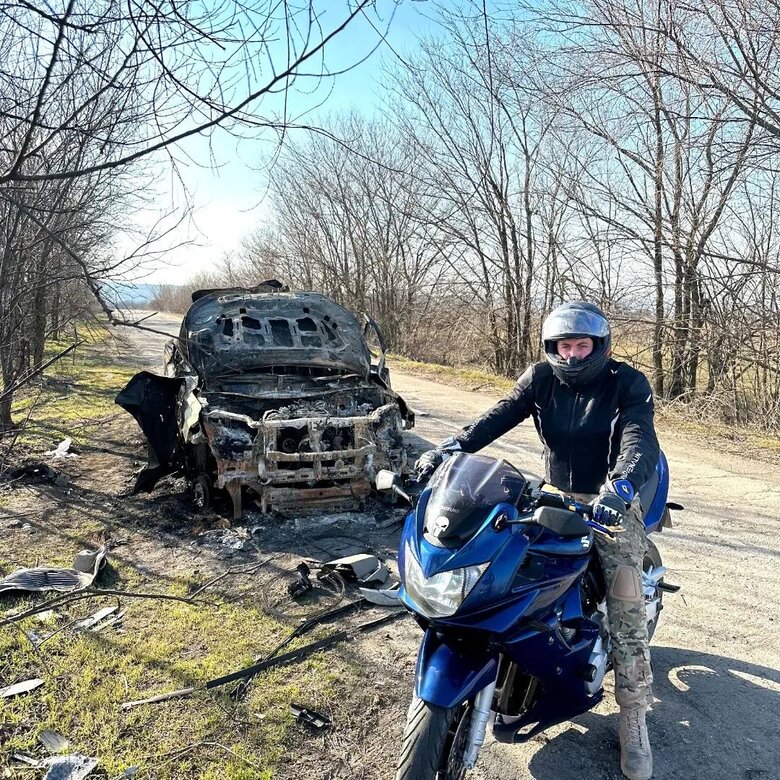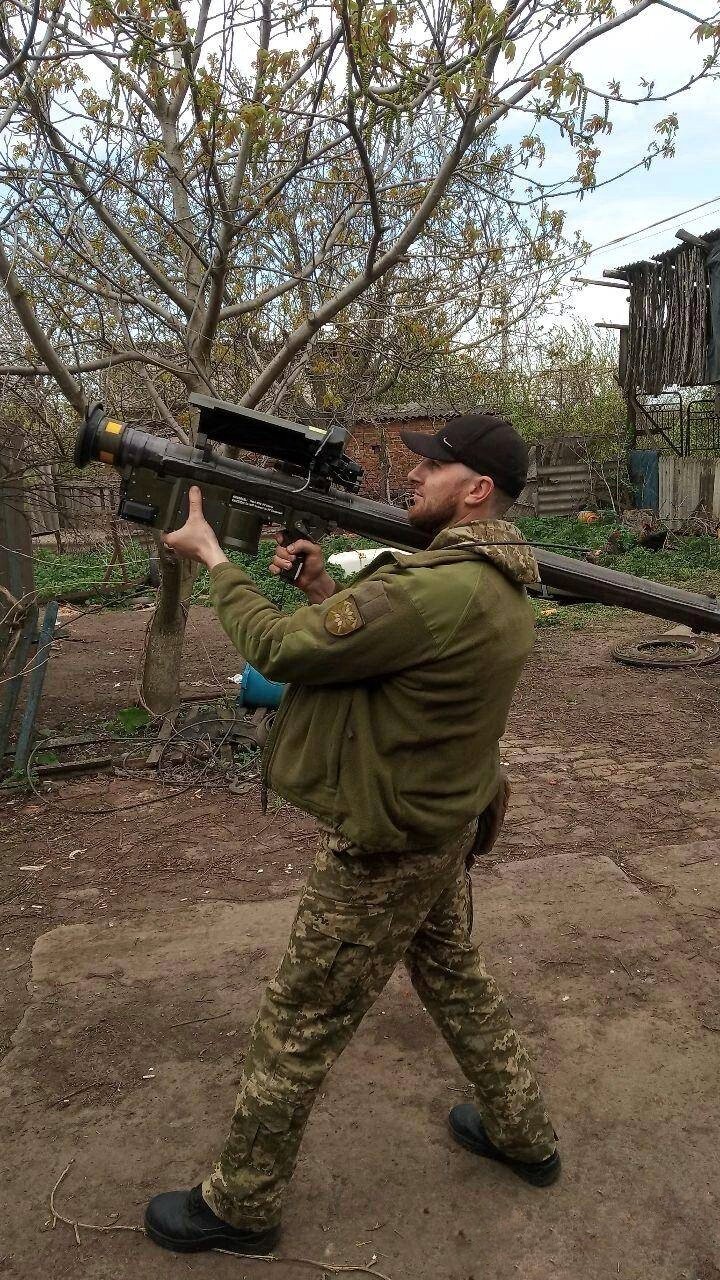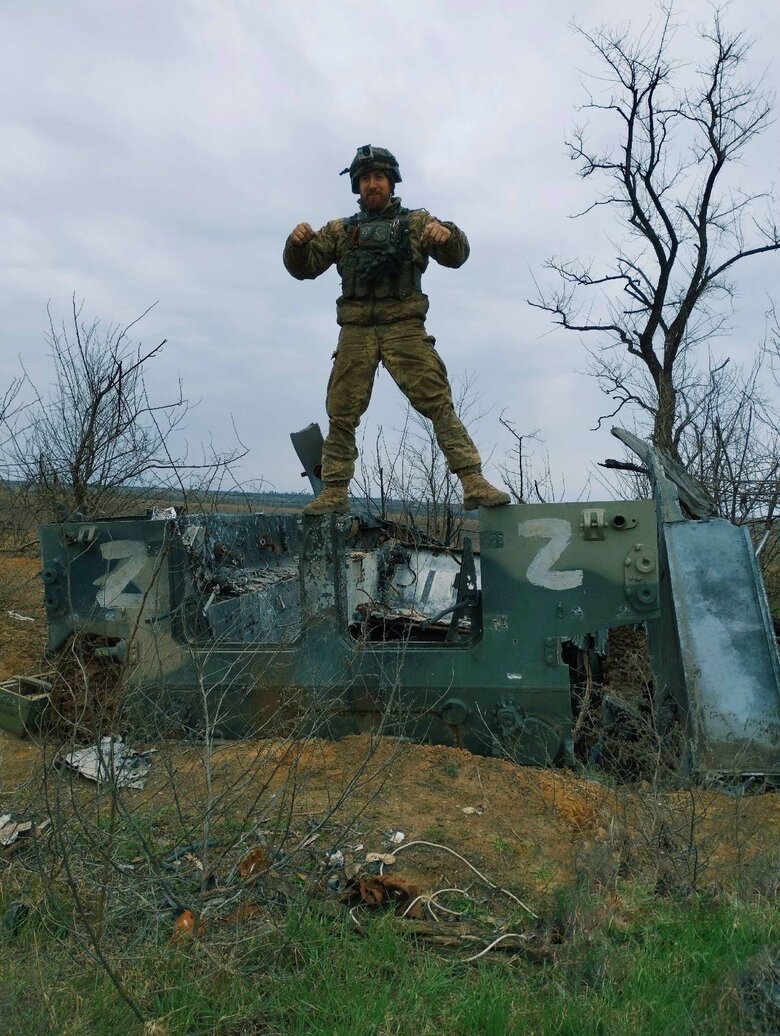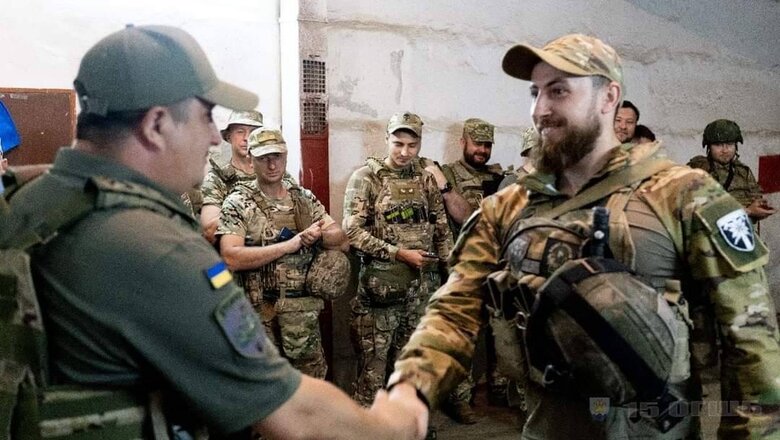Oleksandr Petlinskyi: "I came to position from night duty. Guys: "Do you know that Biden quoted you?" I laughed. I thought they were joking."
The most popular and influential media wrote about him. He was quoted by American President Joe Biden. At the beginning of the full-scale invasion, he set a world record for the destruction of armored vehicles with the Javelin - he destroyed six targets in one day.
Oleksandr Petlinskyi, a fighter with the 128th Separate Mountain Assault Brigade, call sign Aidar, still considers this missile system an effective weapon. However, he hasn't fired from it for a long time because of an arm injury. For the same reason, he is now working as an instructor - because of his limited functionality, he cannot perform tasks at the front as before. However, he has already given ten years of his life to this war.
-Why did you decide to go to war in 2014?
- In fact, it all started with the Maidan - I went there because I couldn't just watch what was happening. When the Russian occupiers invaded Donbas in early 2014, I realised that if I and other men stayed at home in this situation, the Russians would come and have us over a barrel, and we would be fighting not for Ukraine, but for their interests. Even though I had no experience, I went to the military commissariat anyway. They behaved as if they wanted me to "give a kickback" for going to serve. I looked at them, turned around and went back to the Maidan. There were guys there who were forming a battalion that later became Aidar. I joined, was trained and went to war. It was voluntary. No one chased me or forced me.
- Where did you find yourself immediately?
- Polovynkyne (a village in the Luhansk region - O.M.). I received weapons and our military career began. We were scouts, but we also participated in assaults. In our battalion, most of the guys were from the Luhansk region, so they knew the area - where and how to get there. Plus, they had connections with the locals, who also provided information. I served like that until October 2014, when I got my first injury. I still have 15 pieces of shrapnel in my leg.
- How did this happen?
- We were moving in a group, catching up with the enemy. Our sniper hit a tripwire. I heard a loud noise, and shouted: "Fall down!" He fell down. I fell on him. I had armour, but he did not - he had only a ghillie, a sniper rifle and an ammunition load.
- So you saved his life.
- Yes, I did. It was also interesting - being wounded, I took us all out of there in a car because no one else knew how to drive. Then we got to the local hospital. They stitched me up there, but they only made it worse - it started to rot. I asked the guys to transfer me to a military hospital so that I wouldn't be treated to death here. There, a doctor saved my leg. Then I was sent to Kharkiv. A local deputy came there. He promised us a car, made a big show of himself, left and did nothing.
- But you returned to the front after being wounded...
- I returned three months after being wounded. I did not go to reconnaissance anymore - I could not physically perform tasks, because I had to walk and run a lot, and my leg hurt. I joined an anti-tank platoon. Over time, I got bored there, so I asked to be transferred to the assault platoon. In the spring, I got a second injury to the same leg - the bone was broken. I was treated and in two and a half months I was back in service.
- However, later you planned to discharge from the army in March 2022. Why?
- The situation at the front became stable, the war became a trench war: observation, posts, no advancement. Plus, the decision to ban firing - to just stand there and not destroy the enemy. I did not see a serious threat at the time. Therefore, I planned to discharge and return home to my family to raise my son and work.
- For a well-known reason, this did not happen.
- It was not meant to be (smiles. - O.M.).
- How did you find out about the full-scale offensive?
- I had a guess after the New Year. The Russians began to bring up equipment and personnel. But I didn't think they would go on such a large scale. I assumed that they would try to reach the administrative borders of Donetsk and Luhansk regions. The full-scale attack came as a shock to me. But we held them back.
- In March, at the beginning of the invasion, you set a world record when you destroyed six units of enemy vehicles - tanks and armored vehicles - with your Javelin in one day. Tell us how it happened.
- Our company was already incomplete due to losses in battles and encounters - there were about 50-60 fighters left. There was a convoy coming at us (according to the information I heard) - more than 100 units of various vehicles. You understand the ratio...
-To put it mildly, the forces are not equal.
- Absolutely! This information was not shared with the personnel to avoid demotivation. We stood in expectation. I, my assistant Serhii and the deputy battalion commander, who had all the necessary data, formed an anti-tank strike group. We drove around, looked at positions, where it was better to work from, and drew up a battle map in case of an attack on our direction. In the morning of that day, we talked to the company commander, went on duty and heard on the radio that there was contact with the enemy. We went to the first point - there was a hill. It was very favorable but difficult to get to. The enemy spotted us and did not allow us even to get there, opening fire from tanks and heavy machine guns. We were forced to change our position. As luck would have it, the weather deteriorated: it started to rain, and the ground was muddy. I got to the point, and my assistant brought up a missile. I look - opposite me, at a distance of about two kilometers behind our lines, a tank is firing at our people. I made the first launch. It was very significant for me. I remember it now and still get overwhelmed with emotions. Before that, I had only fired from the Javelin on simulators. And this was the first combat shot! When I fired it, I didn't follow any safety instructions (smiles. - O.M.) - I stood there open-mouthed and watched to see if I would hit. And when it happened, my adrenaline went up, and I told my assistant to give me a second missile, even though you can't shoot from the same position more than once. According to the rules, while the missile is flying, I have to throw away the tube and change my position. However, I made a second shot and destroyed the BMP-3. The enemy also returned fire at us. The tank missed - the shot was in our direction, but fortunately, it did not hit. We moved away 400-500 meters. I went into a clear field and destroyed a combat unit similar to a Tunguska. We went to get a combat ammunition load, as we only had a working one with us - three missiles. We eventually got three more backup missiles. We changed our position. The enemy continued to put pressure on us. They had more equipment and infantry, of course. Our guys were retreating, so I made the next three shots when there was only the enemy. First, I destroyed a BMP-3. Then - another combat unit. Then it was said to be a tank. But everything was on fire, so it was difficult to make out what it was. And the Javelin sees in the infrared spectrum, so it's impossible to understand. After that, we moved to the village. There, a Separatist APC had already entered our planting and started shooting. And it was new - you can hardly hear it working. I run to the car to take and connect the rocket. It is flying at full speed, heading for our vehicle. I realize that it's going to crush me. I am the number one target. Everything is happening very fast - seconds! I gathered all my strength and started running in the other direction to avoid getting under his wheels. I slipped, fell, threw the missile away, held the launcher and rolled. He crashed into our car with all his might near me, was stucking fast and everything was flying at me, because I was at a distance of 15 centimeters. The guys were shooting at him with small arms. It was ineffective - the same as throwing needles at a bulletproof vest, but you can at least hit the guidance and surveillance devices. I regrouped, attached a missile, targeted it and fired. I hit the right side of the vehicle, which exploded along with the rear wheels. It left the battlefield, hit and laid a smoke-screen. The guys told us that it was then on fire in the village.
But in general, it was very difficult that day. You don't know where the enemy is, whether there are our troops further on, or whether we are not surrounded. When their forces are superior and you don't have the necessary information, it's not easy. However, I realized that surrender was not an option. If you don't accept the fight, they will just kill you. But it's better to die with a weapon in your hand than like a pisspants without ever firing. You have to fight for your freedom, independence and life until you win.
- Journalists from the Wall Street Journal learned about this story and came to interview you...
- We then went to the village of Shcherbaky. They wanted to come there. And we were just under assault, under fire. So we saw them for a few minutes. I said a few words while preparing to go to the position. He told it like it is, that Javelin is a very effective weapon. If there had been more of it at the beginning, as well as more people who knew how to use it, and if each platoon had one Javelin operator, we would have killed a lot of Russians. In the early days, they would have fled faster than they came here.
- How did you find out that you were quoted by US President Joe Biden when he visited the Javelin plant after this article was published? How did you react?
- You know that we, the military, often joke and lark around at each other to boost morale. I came to the position from night duty. The guys ask me: "Do you know that Biden quoted you?" I laughed. I thought they were joking. How can the President of America quote an ordinary Ukrainian soldier? The next day - trips. I didn't surf the Internet much. First of all, I had no time. Secondly, we had a bad connection. Even the radio didn't work well because of enemy electronic warfare, what can we say about the Internet. I'm coming back. The guys are there again: "Biden mentioned you!" They showed me the story. It showed Biden's speech, and then they inserted what I said in that interview at the end. And I still had a sore throat, so my voice was so nasty (smiles. - O.M.). I was also busy preparing, so I got distracted. I get a call on the walkie-talkie. Everyone is running around. But still, when I realized that I was quoted by the American president, I was very pleased. I was proud, as was my family. At that time, it motivated me even more to destroy the enemy.
- Javelins were popular at the beginning of the full-scale invasion. Have they faded into the background now?
- There is no massive use in all areas. But they are popular where the enemy is trying to go on the frontal assault with armor. Yes, the Javelin has its own nuances: it takes a long time to cool down, and the system does not start up very quickly. But there are more advantages than disadvantages. It has great efficiency. In terms of accuracy, I have not missed a single shot. In Bakhmut, the Javeline operators hit the enemy when they were advancing. In Chasiv Yar, too. It is clear that they do not use them on infantry - it is expensive. At the beginning of the full-scale war, one missile cost about 80 thousand dollars. Now it seems to be 40. But it's still not cheap. It's foolish to shoot at infantry with such systems. That is why they are not used so often. They are used for armor, for armored vehicles. I personally think so: today every company should have at least two Javelin operators. And those who know each position and move between them. I repeat, the Javelin is a very effective weapon that can destroy a tank or an IFV.
- Perhaps the reason is also that drones, in particular FPV, have begun to be actively used.
- Yes. Even the price difference is obvious: a missile costs 40 thousand dollars, a drone costs four thousand hryvnias. It's easy to calculate how many FPVs can be used for that amount of money. You could destroy both infantry and equipment.
- When was the last time you fired from the Javelin?
- About a year and a half ago. Then I had an injury, I was treated, after which my arm hurt for a long time (although it still hurts now, because the joint is slowly wearing out). Plus, at that time we did not need to use Javelin. The same tanks in our direction no longer moved so close that we could hit them with a missile. In addition, we operated very quickly: we drove out, fired, and ran away.
- I know that you also carried out a difficult evacuation...
- It was in the village of Mali Shcherbaky. I fired back with my Javelin, but I couldn't do it anymore because the battery had no power anymore. So I tried to be useful. I did what I could - I drove military vehicles, delivered combat ammunition load and foodstuffs. Once I delivered ammunition and anti-tank mines to the guys. On the way back, I picked up our damaged "loaf" UAZ truck. I got to Orikhiv.
Then I get a call on the walkie-talkie: "Aidar, Aidar, we have three heavy 300ths!" I changed to the Peugeot and rushed to the village. When I arrive, the poles have already been knocked down, and our car is hit. I loaded the wounded. I see an enemy tank driving on the road I had recently gone to Orikhiv. He fired a shot at the car. I was traveling at a speed of about 130 kilometers per hour, so it didn't hit us. The shell fell into earthfill. That's how I transported the first batch of wounded. On the way to the hospital in Orikhiv, I called again: "Aidar, if you can, go again, because there are still heavy 300ths!" I transported the first ones to the emergency room. I came again - this time there were seven wounded. Then the third time. So I was driving non-stop at 120-140 kilometers per hour, because the car was not going anymore, transporting the wounded. I transported more than 30 guys in about two hours. After that, our guys started to withdraw - each person in whatever way he could. I also followed them, but then I was forbidden to do so as the enemy was shelling heavily and putting pressure on us. And at night, the morale office and I went to pick up those who were leaving the encirclement on foot. Thank God, we succeeded - we transported our infantry to Zaporizhzhia for rehabilitation and reinforcement. A week later, we returned and gradually began to recapture the territories that the enemy had seized.
You know, I'll tell you this: it's easier to fight now. Yes, the enemy is putting pressure, but you understand that you have your comrades in arms behind you - the second and third lines, logistics, communications, "birds", FPV, etc. And at the beginning, there was none of that! Even understanding where everyone was standing, whether help had arrived, where the line was, our plantings. It was much harder!
- You are currently working as an instructor. How do you motivate your fighters?
- I explain: "Guys, if we withdraw from here, tomorrow - from Zaporizhzhia, Dnipro, Kryvyi Rih, and so on, the day after tomorrow they will be all over Ukraine! We have to defend ourselves and fight. If we do not stand, fall or will be eliminated, the enemy will come here and do what they did in Luhansk and Donetsk - make us fight in their interests!" This is our land that we have to defend. We did not come to another country and do not plan to take away someone else's property. I do not understand Russia. What does it want? They also have their own lands, which, by the way, they cannot put in order, and they say they are going to put things in order here. Have they put things in order in many places? They are razing towns and villages to the ground, killing people. All those who came to our land and are trying to capture it must be punished. And those who surrender must be taken prisoner so that we can exchange them for our own people, who are in Russia. But those who do not do this should be mercilessly eliminated without remorse.
Olha Moskaliuk, Censor.NET
Photos are provided by Oleksandr Petlinskyi

